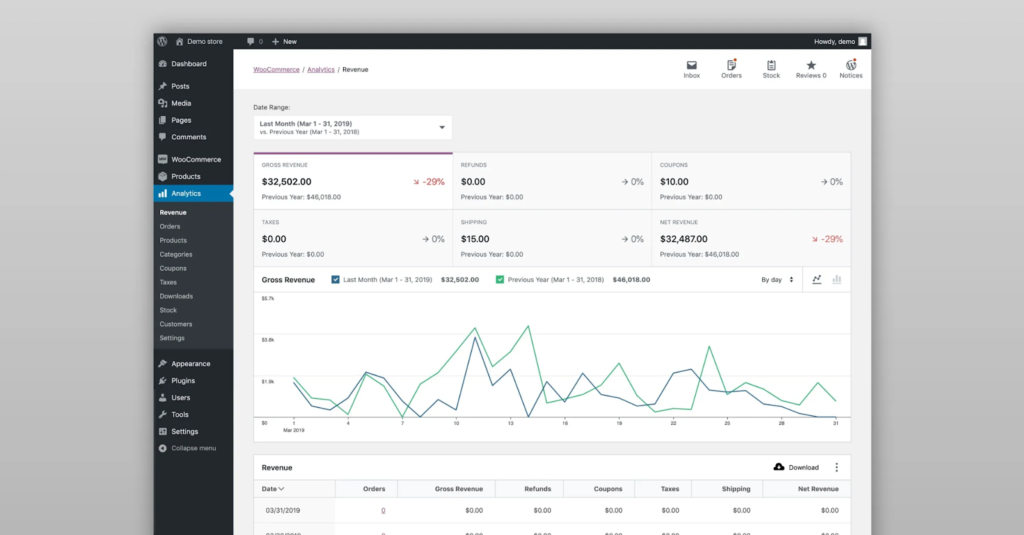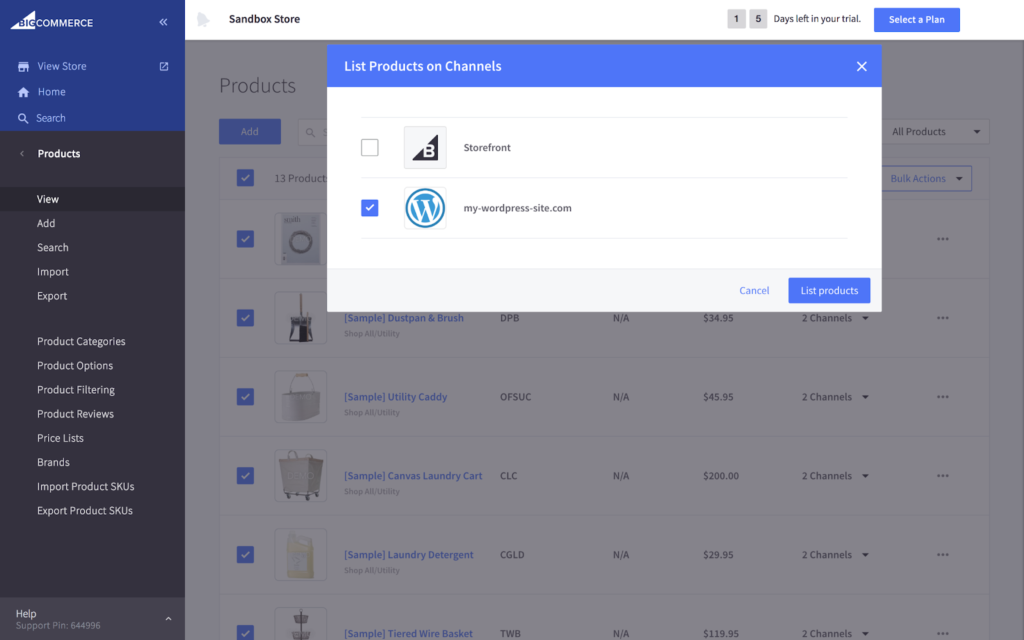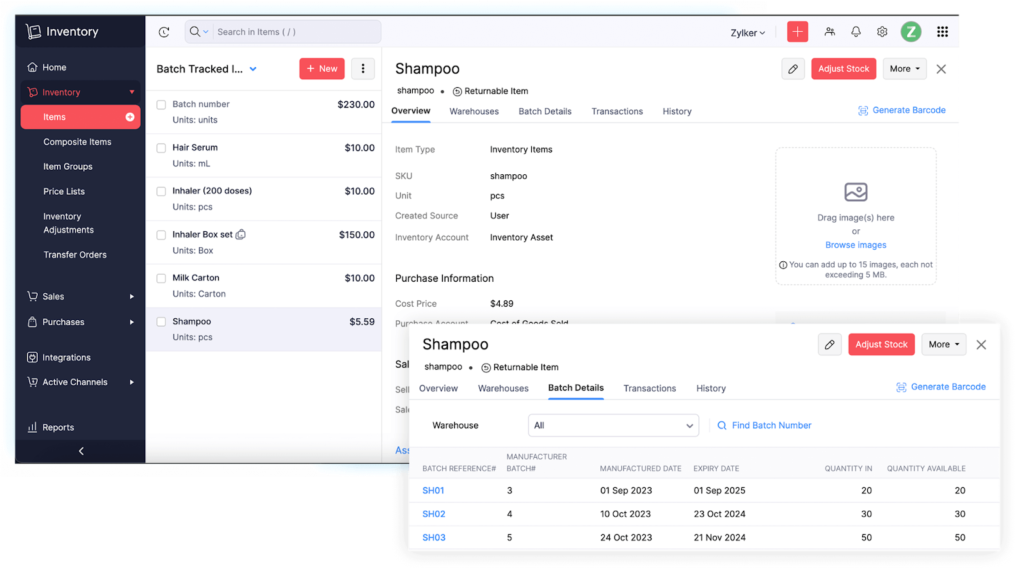Running an online store goes far beyond just listing products and waiting for sales. Effective online store management means keeping track of inventory, ensuring smooth order fulfillment, maintaining a user-friendly website, and optimizing marketing strategies to attract and retain customers. In this guide, we’ll cover the essentials every store owner needs to know to keep their business organized, efficient, and ready to grow.
Why you need online store management software?
Running an online store involves managing many tasks: inventory, orders, payments, customer service, and marketing. Without the right tools, this can quickly become overwhelming and lead to mistakes that hurt sales and customer trust.
Online store management software brings everything into one place, helping you track stock in real time, process orders smoothly, manage customer data, and analyze performance. By automating routine tasks and giving you better visibility into your operations, it saves time, reduces errors, and allows you to focus on growing your business.
Challenges in online store management
Managing an online store isn’t just about selling products; it comes with daily challenges that can slow down your business. Here are some of the biggest problems merchants face, and how the right online store management system can solve them:
1. Inventory problems
Managing stock without proper tools can quickly turn things upside down. You may oversell products that are actually out of stock or understock items that are in high demand.
Both situations lead to frustrated customers and missed sales opportunities. Without real-time inventory tracking, it’s also difficult to forecast demand, restock on time, or identify slow-moving products that are not bringing revenue.
2. Slow order processing
When orders are managed manually or through disconnected systems, the processing time increases. This can lead to delays in shipping, incorrect orders being packed, or even lost transactions.
Slow order fulfillment not only creates blockages in operations but also risks damaging your brand reputation, as customers expect fast and seamless delivery.
3. Poor Customer Experience
A disorganized online store often results in confused customers, whether it’s outdated product information, delayed responses to inquiries, or difficulty tracking orders.
Customers today expect convenience, transparency, and personalized service. If your store cannot deliver that experience, shoppers are more likely to abandon their carts or switch to competitors who provide smoother service.
Top online store management systems
Dealing with inventory errors, slow order processing, and poor customer experiences can seriously hold back the growth of your online business. The good news is that these challenges don’t have to be permanent roadblocks to your business.
With the right online store management system, you can streamline operations, reduce errors, and create a smoother shopping journey for your customers. Let’s take a look at some of the top systems that can help you overcome these issues and keep your business running efficiently.
1. Shopify – Best all-in-one online store management solution

Shopify powers over 4.5 million online stores worldwide, making it one of the most trusted and user-friendly platforms for managing an eCommerce business.
Designed for both beginners and experienced merchants, it offers an all-in-one solution to manage products, process orders, handle payments, and automate marketing. What makes Shopify especially appealing is its combination of simplicity, scalability, and built-in tools that let merchants start small and grow without switching platforms.
From real-time inventory tracking across multiple sales channels to seamless shipping integrations and thousands of apps for added functionality, Shopify gives business owners everything they need in one place. It’s this convenience and reliability that makes so many merchants choose Shopify over other platforms.
2. WooCommerce – Best for WordPress-Based stores

WooCommerce is a flexible and powerful online store management platform built specifically for WordPress users. Unlike Shopify, which is a fully hosted, all-in-one platform, WooCommerce is an open-source plugin that gives merchants absolute power over customization and ownership of their store. This means you’re responsible for hosting, security, and updates, but you also have far more freedom to design and scale your store exactly the way you want.
One of WooCommerce’s biggest strengths lies in its ecosystem of plugins and extensions. Instead of offering everything built-in like Shopify, WooCommerce lets merchants add only the features they need, such as inventory tracking, automated order processing, subscription management, advanced shipping options, or customer loyalty programs. This modular approach makes it highly adaptable, but it can also mean more setup and maintenance effort compared to Shopify’s ready-to-use structure.
3. BigCommerce – Best for scaling businesses

BigCommerce is designed for medium to large eCommerce stores that need a powerful online store management system to handle high sales volumes. It offers built-in features that many platforms require third-party apps for, such as bulk product uploading, multi-channel selling, and advanced SEO tools.
Unlike some platforms that depend heavily on external apps to add key features, BigCommerce includes built-in capabilities, such as inventory management across multiple warehouses and sales channels, so merchants can track stock without needing add-ons. It includes B2B functionality out of the box, which appeals to wholesalers and businesses that sell to other companies.
Another feature is that BigCommerce integrates with many major payment gateways without charging extra transaction fees on top of what the gateway itself charges. BigCommerce offers more than 65 payment gateways integrated immediately, covering over 100 countries and including over 250 local payment methods. Some of the major gateways it supports are Adyen, PayPal, Stripe,…
4. Magento – Best for advanced customization
Magento is a powerful open-source online store management system, but it requires technical expertise to set up and maintain. It gives merchants full control over their store’s backend, allowing for deep customization.
Magento’s biggest strength is its advanced online store inventory management capabilities. Businesses with large inventories can automate stock tracking, set up complex product categories, and manage multiple warehouses efficiently.
Because Magento is highly customizable, it is often used by large enterprises with dedicated development teams. However, its complexity can be overwhelming for small businesses without technical support. Additionally, while Magento itself is free, merchants need to pay for hosting, security, and development services.
5. Square Online – Best for small businesses & brick-and-mortar stores
Square Online is an ideal online store management system for small businesses that sell both online and offline. It seamlessly integrates with Square’s POS (Point of Sale) system, allowing businesses to track in-person and online sales in real time.
One of its standout features is its automatic online store inventory management, which ensures that stock levels are updated instantly after every sale, preventing overselling. This is especially useful for merchants who run both a physical store and an online shop.
Square Online also offers a straightforward, no-code website builder, making it easy for non-technical users to create an online store. It includes built-in payment processing, meaning merchants don’t have to set up a third-party payment gateway.
6. Zoho Inventory – Best for advanced inventory management

Designed to provide automation and detailed stock monitoring, Zoho Inventory is an online system tailored for businesses that need specialized inventory management.. Unlike platforms like Shopify or BigCommerce, which focus on overall store management, Zoho Inventory is dedicated to managing inventory, orders, and warehouses.
With Zoho Inventory, merchants can track stock levels in real time, set up automatic restocking rules, and even manage multiple warehouse locations. It also integrates with major eCommerce platforms like Shopify, WooCommerce, and Amazon, ensuring seamless inventory updates across different sales channels.
Another major advantage of Zoho Inventory is its powerful analytics, which helps businesses forecast demand, reduce overstocking, and optimize supply chain operations. However, since it is purely an inventory management tool, merchants will need to integrate it with an eCommerce platform to handle storefront functions.
Best tips to streamline your ecommerce operations
Below are some practical ways to optimize your online store management and ensure smooth operations.
1. Automate inventory tracking
Managing inventory manually can quickly turn into a nightmare, especially when selling across multiple platforms. So, online store management system with automated inventory tracking will help you prevent overselling, stock shortages, and human errors.
Real-time stock updates also saves merchants from manual adjustments and prevent customer frustration over out-of-stock items.
2. Optimize order fulfillment to reduce delays
Fast and accurate order fulfillment is crucial for customer satisfaction. Therefore, you should integrate seamlessly with fulfillment solutions to ensure a smooth process from checkout to delivery. When an order comes in, it should be automatically assigned to the nearest warehouse or fulfillment center, reducing shipping time and costs.
Many eCommerce businesses rely on third-party logistics (3PL) providers to handle warehousing and shipping. This approach eliminates the need for merchants to store inventory themselves, allowing them to scale operations without worrying about logistics.
Additionally, offering multiple shipping options, such as same-day or next-day delivery – can improve conversion rates. Customers expect fast shipping, and optimizing fulfillment is one of the best ways to meet those expectations.
3. Use data analytics for business decisions

Data-driven insights are necessary to any business. They turn raw information into clear guidance, data-driven insights help businesses make smarter decisions and reduce costly guesswork. Instead of guessing which products will be the best seller, owners can analyze consumer behavior and sales trends to optimize their inventory and advertising.
For instance, sales reports can indicate what products customers tend to buy together, enabling companies to offer improved product bundles or upsell opportunities. Customer behavior analysis can determine which pages are viewed for most of the time, revealing which product descriptions or images work best.
4. Automate customer support
Automating customer support helps online stores run more smoothly by reducing repetitive tasks and improving customer satisfaction. AI-powered chatbots will handle common questions around the clock while automated emails provide real-time order and shipping updates. Self-service tools like FAQs or tracking portals can also give customers instant access to the information they need. Together, these systems lighten the load on support teams while keeping shoppers informed and engaged.
Final thoughts
In conclusion, a good online store management system helps you keep track of inventory, streamline order fulfillment, and improve customer support. This article has introduced you to some of the best options available and shared practical tips to optimize your store’s operations















